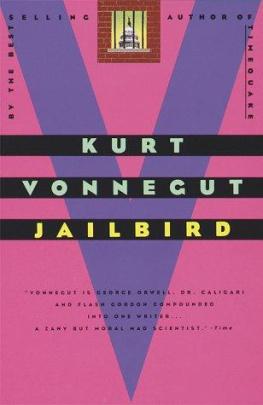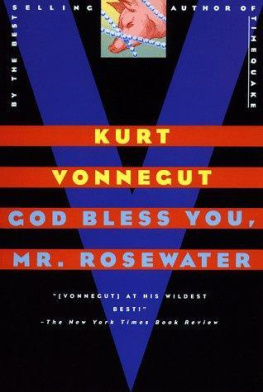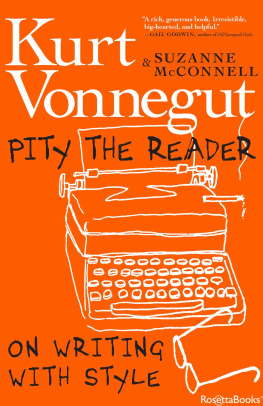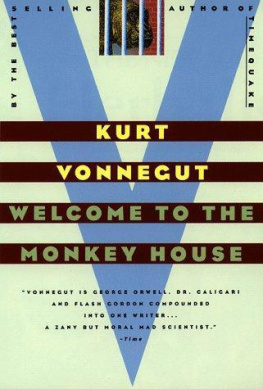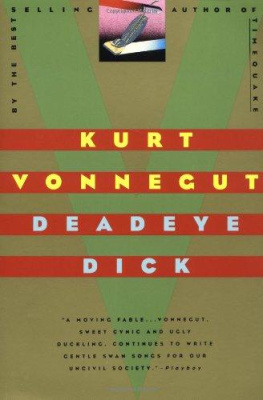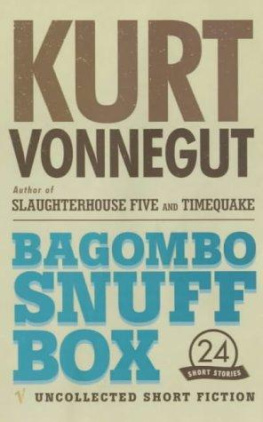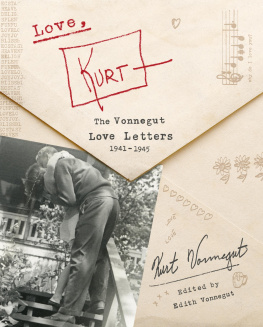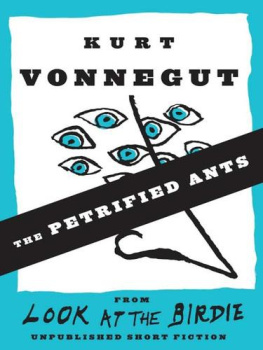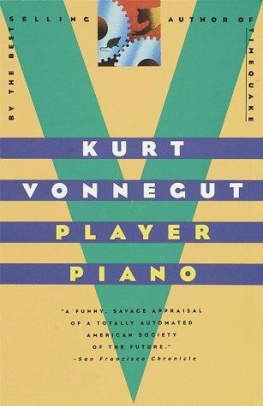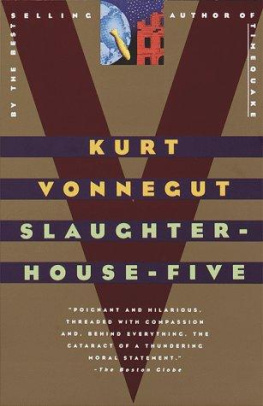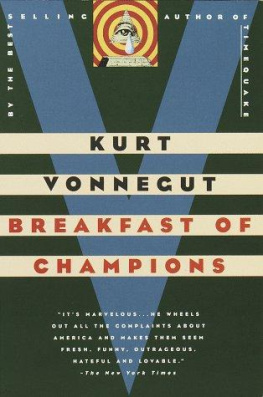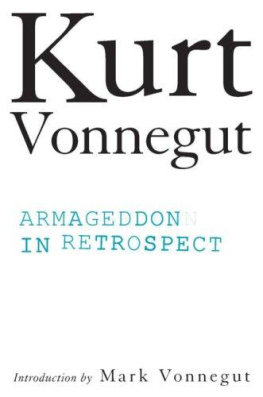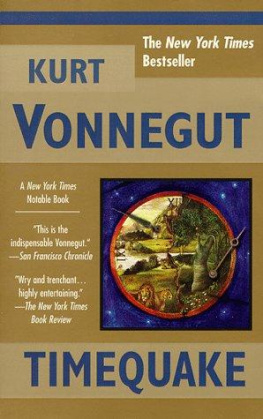Kurt Vonnegut - Jailbird
Here you can read online Kurt Vonnegut - Jailbird full text of the book (entire story) in english for free. Download pdf and epub, get meaning, cover and reviews about this ebook. year: 1979, publisher: Delacorte Press, genre: Art. Description of the work, (preface) as well as reviews are available. Best literature library LitArk.com created for fans of good reading and offers a wide selection of genres:
Romance novel
Science fiction
Adventure
Detective
Science
History
Home and family
Prose
Art
Politics
Computer
Non-fiction
Religion
Business
Children
Humor
Choose a favorite category and find really read worthwhile books. Enjoy immersion in the world of imagination, feel the emotions of the characters or learn something new for yourself, make an fascinating discovery.
- Book:Jailbird
- Author:
- Publisher:Delacorte Press
- Genre:
- Year:1979
- Rating:4 / 5
- Favourites:Add to favourites
- Your mark:
- 80
- 1
- 2
- 3
- 4
- 5
Jailbird: summary, description and annotation
We offer to read an annotation, description, summary or preface (depends on what the author of the book "Jailbird" wrote himself). If you haven't found the necessary information about the book — write in the comments, we will try to find it.
Jailbird — read online for free the complete book (whole text) full work
Below is the text of the book, divided by pages. System saving the place of the last page read, allows you to conveniently read the book "Jailbird" online for free, without having to search again every time where you left off. Put a bookmark, and you can go to the page where you finished reading at any time.
Font size:
Interval:
Bookmark:
file:///F|/rah/Kurt%20Vonnegut/Jailbird.txt
JAILBIRD
BY THE SAME AUTHOR
THE SIRENS OF TITAN
CAT'S CRADLE
GOD BLESS YOU, MR. ROSEWATER
SLAUGHTERHOUSE-FIVE
HAPPY BIRTHDAY, WANDA JUNE
WAMPETERS, FOMA AND GRANFALLOONS
First published in Great Britain 1979
Copyright (c) 1979 by Kurt Vonnegut
Jonathan Cape Ltd, 30 Bedford Square, London WCI
A limited first edition of this book has been
privately printed in the U.S.A.
British Library Cataloguing in Publication Data
Vonnegut, Kurt
Jailbird.
I. Title
823' .9' IF PS3572.05J/
ISBN 0 224 01772 I
Printed in Great Britain by
St Edmundsbury Press Ltd, Haverhill, Suffolk
For Benjamin D. Hitz,
Close friend of my youth,
Best man at my wedding.
Ben, you used to tell me about
Wonderful books you had just read,
And then I would imagine that I
Had read them, too.
You read nothing but the best, Ben,
While I studied chemistry.
Long time no see.
Yes - Kilgore Trout is back again. He could not make it on the outside. That is no disgrace. A lot of good people can't make it on the outside.
******
I received a letter this morning (November 16, 1978) from a young stranger named John Figler, of Crown Point, Indiana. Crown Point is notorious for a jailbreak there by the bank robber John Dillinger, during the depths of the Great Depression. Dillinger escaped by threatening his jailor with a pistol made of soap and shoe polish. His jailor was a woman. God rest his soul, and her soul, too. Dillinger was the Robin Hood of my early youth. He is buried near my parents - and near my sister Alice, who admired him even more than I did - in Crown Hill Cemetery in Indianapolis. Also in there, on the top of Crown Hill, the highest point in the tiny, is James Whitcomb Riley,
"The Hoosier Poet." When my mother was little, she knew Riley well. Dillinger was summarily executed by agents of the Federal Bureau of Investigation. He was shot down in a public place, although he was not trying to escape or resist arrest. So there is nothing recent in my lack of respect for the F.B.I.
John Figler is a law-abiding high-school student. He says in his letter that he has read almost everything of mine and is now prepared to state the single idea that lies at the core of my life's work so far. The words are his: "Love may fail, but courtesy will prevail." This seems true to me - and complete. So I am now in the abashed condition, five days after my fifty-sixth birthday, of realizing that I needn't have bothered to write several books. A sevenword telegram would have done the job. Seriously.
But young Figler's insight reached me too late. I had nearly finished another book - this one.
******
In it is a minor character, "Kenneth Whistler," inspired by an Indianapolis man of my father's generation. The inspirer's name was Powers Hapgood (1900-1949). He is sometimes mentioned in histories of American labor for his deeds of derring-do in strikes and at the protests about the executions of Sacco and Vanzetti, and so on.
I met him only once. I had lunch with him and Father and my Uncle Alex, my father's younger brother, in Stegemeier's Restaurant in downtown Indianapolis after I came home from the European part of World War Two. That was in July of 1945. The first atomic bomb had not yet been dropped on Japan. That would happen in about a month. Imagine that.
I was twenty-two and still in uniform - a private first class who had flunked out of Cornell University as a student of chemistry before going to war. My prospects did not look good. There was no family business to go into. My father's architecture firm was defunct. He was broke. I had just gotten engaged to be married anyway, thinking, "Who but a wife would sleep with me?" My mother, as I have said ad nauseam in other books, had declined to go on living, since she could no longer be what she had been at the time of her marriage - one of the richest women in town.
******
It was Uncle Alex who had arranged the lunch. He and Powers Hapgood had been at Harvard together. Harvard is all through this book, although I myself never went there. I have since taught there, briefly and without distinction - while my own home was going to pieces. I confided that to one of my students - that my home was going to pieces. To which he made this reply: "It shows."
Uncle Alex was so conservative politically that I do not think he would have eaten lunch with Hapgood gladly if Hapgood had not been a fellow Harvard man. Hapgood was then a labor union officer, a vice-president of the local CIO. His wife Mary had been the Socialist Party's candidate for vice-president of the United States again and again.
In fact, the first time I voted in a national election I voted for Norman Thomas and Mary Hapgood, not even knowing that she was an Indianapolis person. Franklin D. Roosevelt and Harry S
Truman won. I imagined that I was a socialist. I believed that socialism would be good for the common man. As a private first class in the infantry, I was surely a common man.
******
The meeting with Hapgood came about because I had told Uncle Alex that I might try to get a job with a labor union after the Army let me go. Unions were admirable instruments for extorting something like economic justice from employers then.
Uncle Alex must have thought something like this: "God help us. Against stupidity even the gods contend in vain. Well - at least there is a Harvard man with whom he can discuss this ridiculous dream."
(It was Schiller who first said that about stupidity and the gods. This was Nietzsche's reply:
"Against boredom even the gods contend in vain.")
So Uncle Alex and I sat down at a front table in Stegemeier's and ordered beers and waited for Father and Hapgood to arrive. They would be coming separately. If they had come together, they would have had nothing to say to each other on the way. Father by then had lost all interest in politics and history and economics and such things. He had taken to saying that people talked too much. Sensations meant more to him than ideas - especially the feel of natural materials at his fingertips. When he was dying about twenty years later, he would say that he wished he had been a potter, making mud pies all day long.
To me that was sad - because he was so well-educated. It seemed to me that he was throwing his knowledge and intelligence away, just as a retreating soldier might throw away his rifle and pack. Other people found it beautiful. He was a much-beloved man in the city, with wonderfully talented hands. He was invariably courteous and innocent. To him all craftsmen were saints, no matter how mean or stupid they might really be.
Uncle Alex, by the way, could do nothing with his hands. Neither could my mother. She could not even cook a breakfast or sew on a button.
Powers Hapgood could mine coal. That's what he did after he graduated from Harvard, when his classmates were taking jobs in family businesses and brokerages and banks and so on: He mined coal. He believed that a true friend of the working people should be a worker himself - and a good one, too.
So I have to say that my father, when I got to know him, when I myself was something like an adult, was a good man in full retreat from life. My mother had already surrendered and vanished from our table of organization. So an air of defeat has always been a companion of mine. So I have always been enchanted by brave veterans like Powers Hapgood, and some others, who were still eager for information of what was really going on, who were still full of ideas of how victory might yet be snatched from the jaws of defeat. "If I am going to go on living," I have thought, "I had better follow them."
Next pageFont size:
Interval:
Bookmark:
Similar books «Jailbird»
Look at similar books to Jailbird. We have selected literature similar in name and meaning in the hope of providing readers with more options to find new, interesting, not yet read works.
Discussion, reviews of the book Jailbird and just readers' own opinions. Leave your comments, write what you think about the work, its meaning or the main characters. Specify what exactly you liked and what you didn't like, and why you think so.

